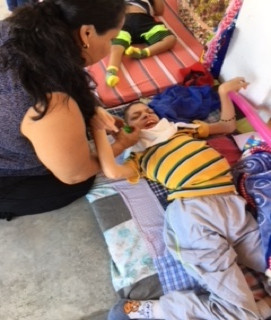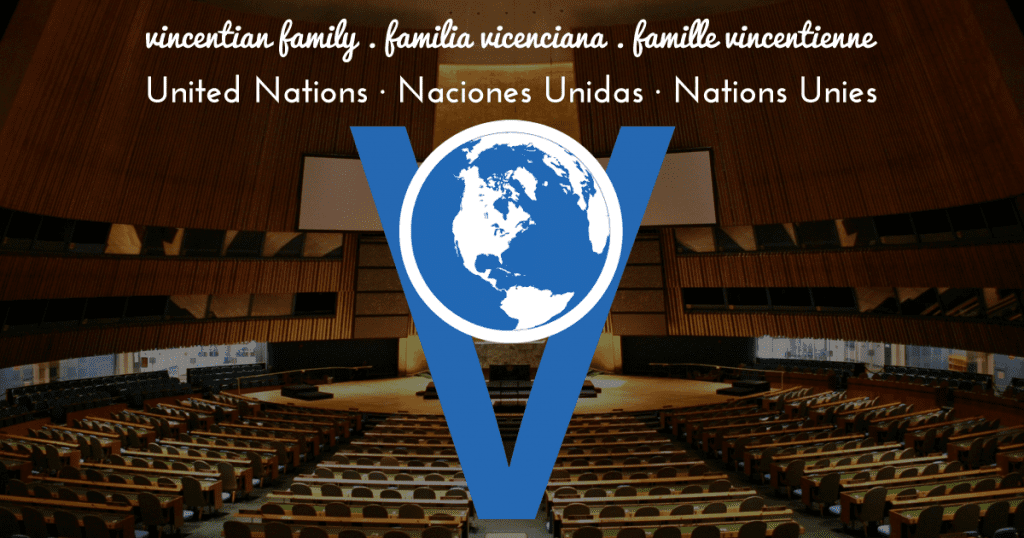“Your pain is my Pain” – SVDP
Religions and the URGENT Humanitarian and Environmental Action
Once Vincent said in talking to the poor, “Your pain is my own pain.” The suffering of hundreds of millions of human beings today is extreme due to the inhumane conditions in which they are forced to live. I recently had the opportunity to visit and work with communities of Colombian, Venezuelan and Haitian refugees. I am wondering how can we talk today about God to the extreme suffering of those left behind in our societies? What kind of speech can we elaborate about God before the pain of so many human beings and the terrible pain continually inflicted on our own mother earth? How can we break the bread in our Eucharist considering all those with no bread at all for themselves and their children? We, the Christians of today, cannot forget the theological and spiritual language of the Cross and the mystery before us: so much pain, so much suffering… the abundant cry of the poor, and the unbearable destruction of the planet… All religions are called to find this same challenge in their own written, historic and existential traditions.
Pope Francis continually talks about what he calls “the plague of indifference.” No doubts, our “world is undergoing a crisis of solidarity.” Can we the people of faith help so that our world overcomes such plague?
On January 22, there was a United Nations symposium on the role of religions in migration. During the reflections from the different speakers, there was a common call: A call for unity in a humanitarian and environmental action. This collective action should become our unanimous voice of solidarity with all those living in poverty and a common prophetic voice against poverty and its structural, political, and social causes.
Faith-based organizations have much to contribute to the process of a new world, to the implementation of the agenda of the common good as expressed in Laudato Si and in the Sustainable Development Goals of the United Nations. We all are urged to become involved however we can, and to bring our moral voice to bear on our local, national, and international leaders.
The world counts on us – our resources, structures, support, and our hard work to maximize that opportunity for the rights and dignity of all human beings and the planet. For us, people of faith, human beings excluded and marginalized are not “others” – they are “us.” They are our sisters and brothers – the members of our unique human family.
“The glory of God is the life of the human person” (Ireneus); the glory of God is the human person standing; the glory of God is the life of the poor (Romero); the glory of God is the life of the planet! If we do not incorporate the human/environmental concerns into our religious experiences/discussions, we will be failing to transform religion into a meaningful experience for us and for new generations. Organized religion tends to fail when it is a self-centered experience in which the main human questions of today are not answered or are just given easy (naive) answers.
Only by upholding our duty to protect the human person – who has been left behind – and our planet will we be able to achieve a more prosperous, secure and equitable future for all and so get closer to God’s imagination of a “new world” (Rev 21, 5). In this very complex political and social environment, “we must speak out against discrimination and intolerance, and counter those who seek to win votes through fearmongering and divisiveness.”
Policy makers, religious leaders, other leaders of the civil society, and academics must gather together to tackle the most sensitive issues of the humanitarian and global crisis we are going through: starvation, climate change, migrants and refugees, politics of complexity and failure, social protection floors, rights for all, systemic exclusion of the majority, growing inequality, war, etc.
Faith based organizations have a role to play in these dialogues and in the actions planned so that we can really make the life in this planet sustainable.
Let me share a story to close this reflection. While I was celebrating Christmas with a community of families in extreme poverty and with children with disabilities, a member of the International Association of Charities gave me the most beautiful lesson of resilience and love. She dedicated her life for more than a year to help a 17-year-old boy with severe muscular dystrophy—a dedication that contributed to him being able to put his arms together to be able to give and receive a hug. After many, many hours of therapy and training, he finally was ready for this formidable task. The IAC member called this boy’s mom (who else?) to be the first one to have this experience. They both hugged for a long five minutes in which both could not stop crying. The mom’s tears were of joy and release of her long pain — 17 years dedicated to her son without ever hearing his voice but knowing in her heart everything he was saying. The boy’s tears were of thanksgiving — for the first time in his life he was hugging the woman who was always there for him, who never, not even once, abandoned him… she was his everything… for him she was a God-like person.

AIC volunteer and the Boy she helped to HUG.
Are we and all our faith based organizations ready to continue our work of healing, restoring, and transforming the cruelty of our world into resilience, reconciliation, justice, and rights for all?
“Your pain is my pain…”
Guillermo Campuzano, CM is the Congregation of the Mission UN representative








0 Comments